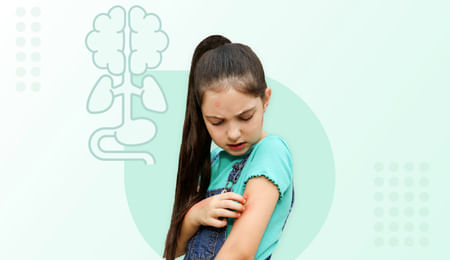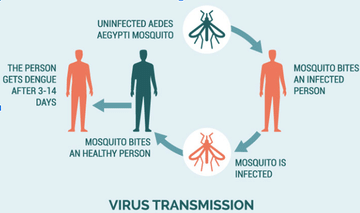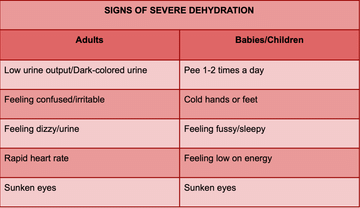
Dengue
- All age groups
- Both men and women
- Liver
- Lungs
- Brain
- Spleen
- Malaria
- Zika
- Chikungunya
- Influenza (flu)
- Measles
- General physician
- Internal medicine specialist
Symptoms Of Dengue
The symptoms of dengue can be confused with other common illnesses such as flu, malaria, and chikungunya. However, dengue should be suspected if you develop a sudden onset of high-grade fever (40°C/104°F) along with rash, nausea and body aches.
According to the WHO, dengue can be categorised into 3 phases:
- Febrile phase
- Critical phase
- Recovery phase
1. Febrile phase
- Generalized body ache
- Eye pain (pain with eye movement)
- Muscle pain
- Joint pain
- Headache
- Loss of appetite
- Nausea
- Vomiting
- Facial flushing
- Skin rashes
- Respiratory symptoms (cough, sore throat, congestion, etc)
2. Critical phase
The fever usually decreases around the 3rd to 7th day of illness. This marks the beginning of the critical phase. It is followed by extreme fatigue which can last for a few days to weeks. There could also be a rapid decrease in the platelet & leucocyte (white blood cell) count. In some cases, there can be severe organ impairment & internal bleeding.
3. Recovery phase
Post critical phase, there is an improvement in the condition of the patient in the following 48-72 hours. In this phase, there is an improvement in the appetite and gastrointestinal symptoms. There might be a reappearance of skin rash in the recovery phase.
Note: In younger children, these symptoms are generally mild but older kids and adults may have moderate to severe symptoms depending on the intensity of the infection.
Signs of severe dengue
As per the CDC, about 1 in 20 people who get sick with dengue may develop a severe form of dengue. After the first sign of dengue appears, it may take around 3-7 days for the disease to turn into a severe condition. This is the critical phase which can even lead to a drop in the temperature which is not a sign that a person is recovering but a sign that special care is needed.
The warning signs which indicate severe dengue are:
- Severe abdominal pain
- Rash all over the body
- Bleeding gums
- Blood in vomit
- Rapid heart rate
- Low blood pressure
- Difficulty in breathing
- Fatigue/ restlessness
- Severe bleeding
In case you suffer from any of these symptoms, it is advised to immediately get admitted to a hospital and follow your doctor’s suggestions without fail.
Suspect that your fever is due to dengue? Get a dengue test from the comfort of your home.
Causes Of Dengue

Dengue is a viral infection caused by the bite of a female Aedes Aegypti mosquito. The virus that causes dengue is known as dengue virus (DENV), which belongs to the family of Flaviviridae viruses. There are four different types of dengue virus namely DENV-1, DENV-2, DENV-3 and DENV-4.
When the mosquito infected with dengue virus bites a healthy person, the virus spreads into the bloodstream causing the infection. The mosquito that causes dengue can be identified by characteristic black and white markings over its body. It breeds in stagnant water and is mostly seen during early hours of the day. Infection with any one of the serotypes confers lifelong immunity from that particular strain.
Risk Factors For Dengue
You may be at a high risk of suffering from dengue if:
- There are several cases of dengue in your locality.
- Your area has pooled water or if you work in construction sites as the risk of breeding mosquitoes is high in such areas.
- You travel to places where the prevalence of dengue is high.
Diagnosis Of Dengue
If a person is down with high fever, nausea, rash, and bodyache, then it is wise to get a blood test done. In most cases, a complete blood count (including a platelet count) is recommended if your doctor suspects dengue. However, it is a nonspecific test because it doesn’t help to confirm the presence of the dengue virus or detect the type of virus.
To detect the presence of the dengue virus in the blood, you need to undergo definitive tests which include:
1. Dengue antigen test
Also known as dengue NS1 antigen test, this blood test helps to detect the dengue virus early in the course of an infection. It should be done within the first five days of the appearance of symptoms because after 5 to 7 days the chances of false positive and negative results are high.
2. Dengue antibody IgM test
This test looks for IgM (antibodies) in the blood, which appear in the early course of the disease (acute infection). The test can also help to differentiate between primary (first time infection) and secondary (second time infection with the other serotypes) infection.
3. Dengue antibody IgG test
The test is used to detect infection in the later course of the disease because the level of IgG in the blood tends to increase slowly. Usually, the level increases 6 to 10 days after the infection and the antibodies can remain in the blood for around 90 days or for the rest of your life.
4. Dengue RNA PCR test
It is a primary test used to detect dengue virus in the early course of the infection. A positive result not only confirms the infection but also helps to identify the different serotypes of the dengue virus. The test is around 90% sensitive and 95% specific.
Prevention Of Dengue
The best way to prevent dengue is to prevent mosquitoes in your immediate surroundings. To achieve this, you need to:
1. Prevent water stagnation
Look around the house and get rid of any source of water stagnation since the mosquitoes breed in stagnating water. Drain your buckets of water after bathing or washing ensuring that mugs and buckets are dry. Fix any leaking taps in the bathroom and kitchen so that the area remains dry and water does not collect in containers. Drain the water from water coolers and keep it dry. Do not overwater potted plants to prevent water stagnation in the soil.
2. Use mosquito nets
Use mosquito nets at night to prevent getting bitten by mosquitoes. You can use them during the day for babies and elderly who tend to take a nap in the afternoon. You should cover up and close any holes in the windows and doors from where mosquitoes might enter. Wire mesh screens can be used on windows to block out mosquitoes.
3. Apply mosquito repellents
Use mosquito repellent cream especially for kids who go out to play. Mosquito repellent liquidators are also widely available in the market and used for driving out mosquitoes from the house. Apart from the mosquito repellents available in the markets, there are few natural ways to get rid of mosquitoes like burning camphor, lighting lavender candles, using citronella or eucalyptus essential oil and keeping a potted tulsi plant near the window.
Specialist To Visit
A normal fever usually may cause throat pain, runny nose, weakness, mild body aches, and high body temperature. On the contrary, a dengue-infected person will show flu-like symptoms such as high-grade fever, severe bodyache along with rashes all over the body.
If you experience any signs and symptoms of dengue, it is important to consult your doctor at the earliest. Usually, your family doctor or general physician is the right doctor to go to. In some cases, you may also need to consult an internal medicine specialist.
Treatment Of Dengue
There is no specific treatment for dengue. This is the reason why the treatment is aimed at relieving the symptoms. Most patients with dengue fever have mild illness and can be treated at home by following strict dietary guidelines and course of medication. In case of severe dengue, where the platelet count drops severely (a condition known as thrombocytopenia), platelet transfusion is advised.
1. Take sufficient rest
As dengue causes severe fatigue and high fever, make sure you rest as much as possible and give your body sufficient time to recover.
2. Bring down your fever
- Antipyretic drugs like paracetamol can help to bring down the temperature and also relieve body aches.
- Drugs such as aspirin and other painkillers should be avoided as they may increase the risk of bleeding/hemorrhage.
- Antibiotics are generally not required.
- Sponging the person with cool water can help to reduce fever.
3. Stay hydrated
Dehydration is a common complication of dengue as water is lost due to fever, vomiting and not drinking enough fluids. So to prevent it, make sure you stay hydrated by drinking fluids in the form of coconut water, buttermilk, fruit juices, lemon water, milk and drinks with electrolytes along with water. 
If you experience any of these signs of severe dehydration, then it is wise to consult a doctor immeditely to prevent complications.
4. Monitor your condition
The period after the fever starts to subside is critical. Some people develop warning signs such as vomiting (at least 3 times in 24 hours), difficulty in breathing, bleeding from the nose or gums and blood in vomit/stool within a day or two after the fever goes down. This is seen in around 1 in 20 people with dengue and may require hospitalization as it could be life-threatening. So be extra careful and keep a close eye on the warning signs.
REMEMBER! Severe dengue is a medical emergency and warrants immediate medical care at a hospital.
5. Try home remedies
Few home remedies are found to be quite popular in the treatment of dengue fever as they have been known to increase the platelet count.
Papaya leaves: According to a research (Subenthiran S, et al), the juice of papaya leaves is known to inhibit the growth of dengue virus and increase platelet count.
Giloy: Packed with anti-inflammatory and antipyretic (fever reducer) properties, giloy juice is known to aid in the management of dengue fever. It not only increases platelet count but also improves immunity aiding in quick recovery.
Kiwi: Many people believe that eating kiwi fruit daily improves platelet count. However, there is no research study to prove its efficacy in increasing the platelet count. The fruit is rich in Vitamin C which not only acts as a potent antioxidant but also boosts immunity.
Watch this video to know more about the tests, treatment and what to eat and avoid in dengue.
Complications Of Dengue
- Low platelet count (<1 lac)
- Fever for 2 to 7 days
- Hemorrhagic manifestations (internal bleeding)
In the early stages, the platelet count is usually within normal range but hemoglobin level may be high. If the hemoglobin level is raised (>14g/dL), a doctor should be consulted even if the platelet count is in the normal range. The platelet count begins to fall once the fever starts to come down. Even when the platelet count is falling, there is no need to panic.
REMEMBER! There is no role of platelet transfusions in a patient who has no active bleeding. Do not insist your doctor for platelet transfusion in the absence of bleeding.